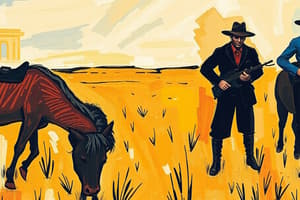Podcast
Questions and Answers
How is the beginning of the scene similar to the beginning of the novel? How is it different? What is John Steinbeck's purpose of doing this?
How is the beginning of the scene similar to the beginning of the novel? How is it different? What is John Steinbeck's purpose of doing this?
It is at the same location as the beginning. In the beginning of this chapter, Steinbeck creates an ominous mood by having the heron eat the water snake. He has the end in the same location as the beginning to bring the book full circle.
What two characters is Lennie speaking to at the beginning of the chapter? What do each say to him? What do they represent?
What two characters is Lennie speaking to at the beginning of the chapter? What do each say to him? What do they represent?
Lennie is speaking to his Aunt Clara and a rabbit. Aunt Clara reprimands him because all that George does is take care of him, but Lennie goes and gets in trouble. The rabbit tells Lennie that George will not trust Lennie with tending the rabbits. They represent his internal conflict.
Describe George's attitude when he approaches Lennie. Is this expected? Why or why not?
Describe George's attitude when he approaches Lennie. Is this expected? Why or why not?
George is very calm when talking to Lennie. His attitude is very unexpected because, in the past, George yells at him, and then it's over.
What does Lennie ask George to do as he sits by the river? How does this make Lennie feel?
What does Lennie ask George to do as he sits by the river? How does this make Lennie feel?
Describe George's actions when speaking to Lennie. What do these actions suggest about George's feelings at the moment?
Describe George's actions when speaking to Lennie. What do these actions suggest about George's feelings at the moment?
George and Lennie were said to be unlike other migrant workers. How has this changed?
George and Lennie were said to be unlike other migrant workers. How has this changed?
What does George finally decide to do with Lennie? Why did he make this decision?
What does George finally decide to do with Lennie? Why did he make this decision?
What past events helped foreshadow George killing Lennie?
What past events helped foreshadow George killing Lennie?
When the rest of the men meet up with George, which character is able to sympathize most with George? Why?
When the rest of the men meet up with George, which character is able to sympathize most with George? Why?
What characters do not understand what George has done? Why? What do they represent?
What characters do not understand what George has done? Why? What do they represent?
Flashcards are hidden until you start studying
Study Notes
Chapter 6 Overview
- The chapter begins and ends at the same location, enhancing a sense of closure.
- An ominous mood is established with imagery of a heron eating a water snake, contrasting with the novel's beginning.
Lennie's Conversations
- Lennie converses with Aunt Clara and a rabbit, representing his internal conflict.
- Aunt Clara criticizes Lennie for causing trouble despite George's care; the rabbit tells him George won't let him tend the rabbits.
George's Attitude
- George approaches Lennie with calmness, which is unexpected given their history of conflict.
- This reflective demeanor suggests a shift in George's emotional state, indicating sorrow and acceptance.
Lennie's Request
- Lennie requests George to recount their dream, which brings him comfort and happiness amidst despair.
George's Actions
- George comforts Lennie, signaling his desire to protect him from the impending mob.
- This suggests George's dual role of caretaker and harbinger of difficult decisions.
Changes in George and Lennie's Dynamic
- George plans to spend his money on a cathouse, reflecting a loss of hope and their bond.
- The separation of George and Lennie contrasts their previous unbreakable partnership as migrant workers.
George's Decision
- George ultimately decides to kill Lennie to spare him suffering at the hands of the mob.
- This decision highlights themes of mercy and protective love amidst harsh realities.
Foreshadowing
- The death of Candy's dog foreshadows Lennie's fate, drawing parallels in the method of death and emotional weight.
Sympathy from Slim
- Slim empathizes with George due to their close bond, having gained insight into George's profound love for Lennie.
Misunderstanding by Others
- Curley and Carlson fail to grasp George’s actions, driven by their limited perspectives as migrant workers.
- They embody a lack of understanding and empathy within the larger context of survival and harshness of life on the road.
Studying That Suits You
Use AI to generate personalized quizzes and flashcards to suit your learning preferences.




